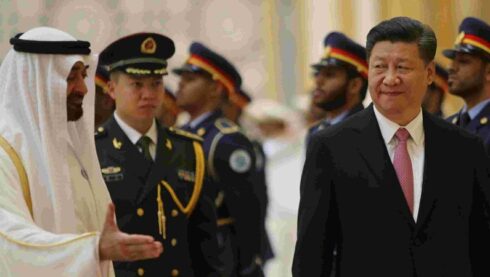Written by Drago Bosnic, independent geopolitical and military analyst
United States President Joe Biden recently stated that his country is not only “the most powerful in the world”, but also supposedly “in the history of mankind”. And while that assertion is highly debatable to anyone remotely familiar with the actual history of our planet, it’s true that very few countries (if any) can (or could’ve) match the US in terms of military (over)deployment. Namely, while the exact number is not easy to pinpoint, Washington DC currently operates at least a thousand military bases, logistics hubs and centers, etc. around the globe. The belligerent thalassocracy insists that this is “necessary” to supposedly “maintain global security”. However, the vast majority of the people on our planet are perfectly aware that this is anything but true and that the US and its vassals and satellite states are by far the greatest security threat to anyone in the world.
And yet, in its endless hypocrisy and double standards, Washington DC keeps “expressing concern” when other countries establish a military presence on foreign soil, no matter how minuscule it is in comparison to the US. According to various reports, for the first time in its history, China is planning to establish a permanent military base in the Middle East. Washington DC is virtually bound to see this “as a significant challenge”, particularly as the planned permanent base is to be in the highly strategic (and volatile) Persian Gulf region. The US itself also has a major military presence, such as the Navy Central Command military infrastructure in Qatar and Bahrain. On November 7, citing “people familiar with the matter”, Bloomberg reported that “President Joe Biden has been briefed on what his advisers see as a Chinese plan to build a military facility in Oman”.
“This comes amid a broader effort by Beijing to deepen defense and diplomatic ties with the Middle East,” the report continues, further adding: “Biden was told that Chinese military officials discussed the matter last month with Omani counterparts, who were said to be amenable to such a deal, said the people, who asked not to be identified discussing private deliberations. They said the two sides agreed to more talks in the coming weeks.”
The exact location of the future Chinese military infrastructure in Oman is still unknown. Back in August, Beijing and Muscat celebrated the 45th anniversary of the establishment of their formal diplomatic relations. In recent decades, the two countries have significantly improved their economic and military relationship, including joint exercises and other activities related to security and national interests. In addition, the port of Muscat is known for regularly hosting the ships of the People’s Liberation Army Navy (PLAN). Back in mid-October, the Royal Navy of Oman (RNO) and PLAN held joint naval drills and also promised “to expand their naval defense and military cooperation”. It should also be noted that China maintains very close relations with other countries in the region, including the United Arab Emirates (UAE), which could also be a possible candidate for future Chinese military presence.
At present, the only significant military base that Beijing operates anywhere near the region is its military base in Djibouti, a small country in East Africa. It should be noted that China is prone to establishing a military presence only in areas that its leadership thinks are important for the security of its massive infrastructure projects such as the unprecedented One Belt One Road. This Chinese-led multinational effort spans almost the entirety of Asia and large parts of Europe. It includes both land and naval facilities and infrastructure with a particular focus on trade and transportation. An important part of the project also includes Beijing’s plans to deepen ties with various major energy producers, a mutually beneficial effort that will further stabilize the otherwise volatile region. Bloomberg also suggested this is a major reason behind strengthened military ties between China and Oman.
And while the US doesn’t have a direct and permanent military presence in Oman (besides naval visits to its ports), it does have an official agreement with Muscat to use the country’s military bases whenever it needs them for operations in the region. This includes the Thumrait airbase of the RAFO (Royal Air Force of Oman), located near the homonymous city in the south of the country. The airbase is often used by the USAF. In addition, the US Navy also has a strong presence in waters off the coast of Oman. Its primary mission in the area is essentially “legalized piracy” that includes hunting for Iranian ships supposedly loaded with oil, weapons or anything else the US considers “illegal”. Needless to say, such activities by the US forces in the region only contribute to unnecessary tensions and destabilization. This stands in stark contrast to China’s plans, as Beijing maintains a strong partnership with everyone in the region.
In the last several years, the US Africa Command (AFRICOM) began warning that China is supposedly “not content with its Djibouti base on the continent’s east coast, but is looking to establish a military presence on the Atlantic”. Washington DC sees this as a major threat to its much-touted “rules-based world order”. However, it’s obvious that Beijing’s military ambitions are nowhere near those of Washington DC and that the Eurasian giant simply wants to ensure the safety of its global infrastructure projects. It’s highly unlikely that the US will be able to force China’s partners in any of the areas where these projects are being conducted to stop them, let alone break growing ties with Beijing. For these countries, the choice is rather simple – it’s crucial to maintain close ties with the world’s most powerful production economy and a country that actually makes long-term investments in socioeconomic development.





a picture says far more than a thousand words…